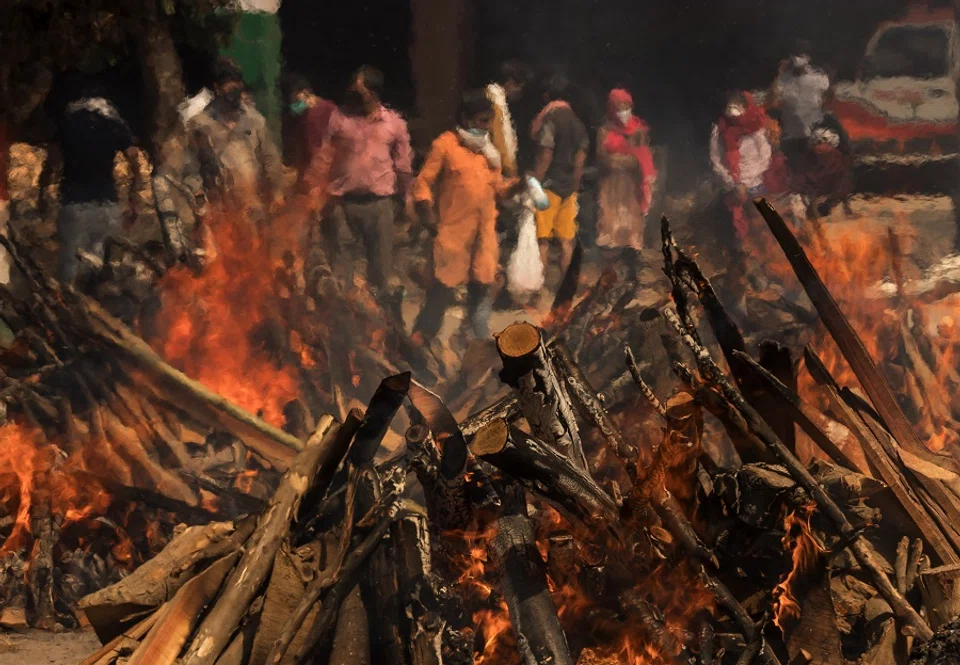China's top infectious diseases expert: India faces even bigger Covid-19 outbreak ahead
Zhang Wenhong, China's top infectious disease expert who was dubbed by the New York Times as China's Dr Fauci, gives his opinion on the Covid-19 pandemic crisis in India, which is seeing more than 300,000 infections daily. With a large domestic population and a low vaccination rate, what will it take for the country to survive the current crisis?

India reported 346,786 new Covid-19 cases over a 24-hour period as of 8am local time on Saturday, taking the country's total caseload to 166,104,881. As the infections continue to surge, the death toll has also increased sharply.
Double mutant variant
A double mutant variant of the coronavirus, B.1.617, was detected in India in October 2020, which carries the mutations of E484Q and L452R in the spike protein part of the pathogen. Based on genomic data, the transmissibility of B.1.617 is close to B.1.17 (British mutant) and higher than B.1.351 (South African mutant). Several countries have now imposed bans on flights from India. As of Tuesday, the B.1.617 variant has been detected in more than 20 countries, none of which had a major outbreak similar to the one in India.
Sharp rise in death toll
Since 16 April, the daily death toll in India exceeded 1,300, reaching a new high after the outbreak, a trend that corresponds to the gradually increasing proportion of B.1.617 in India. By Sunday, the daily death toll had jumped to nearly 2,000. The main reason behind this rise is the strained health care system. When even oxygen supply is in short supply, many young patients are likely to die, who could have otherwise survived. What India needs more than any other medicine right now is oxygen, which would reduce the death rate among young patients.
At the current rate of vaccination, it will take decades to reach the 70% level required for herd immunity and there will be at least millions of additional deaths.

Will India reach herd immunity?
The total infection rate in India stands at 1.16% as of Saturday, according to official data.
At the current rate of vaccination, it will take decades to reach the 70% level required for herd immunity and there will be at least millions of additional deaths. If the situation becomes similar to that of the 1918 influenza pandemic, the government will inevitably be held accountable by the people. Thus, there is still great uncertainty about the future situation in India.
Effectiveness of vaccines
According to studies on the effect of mutant strains on serum viral neutralisation and vaccines, serum samples taken from vaccinated people and recovered patients showed a twofold decrease in neutralising activity against India's double mutant variant B.1.617. However, vaccines are still effective against the virus.
Currently, although the total amount of vaccinations in India is next only to the US and China, due to its large domestic population, the single-dose vaccination rate is just 8%. Such a low rate is far from sufficient to stop the spread of the epidemic. Although the prevalence of the British mutant variant in Israel has had a lowering effect on vaccine efficacy, Israel has over 70% protection rate from vaccination and recovered patients, and the pandemic there is said to be completely under control. This again shows that vaccination remains an important weapon against the virus.
Only with extremely strict public health measures, a resolute and correct response from the government and good cooperation from the people can the country survive the current crisis.

Future of Covid-19 in India
In March, there was a relaxation in social controls in India. Several traditional cultural festivals were held without any social distancing measures. And when the latest wave started, the government was not proactive enough in dealing with it, which led to the exponential rise in cases in April. It is now too late for even an acceleration of vaccination. A bigger wave is still likely. Only with extremely strict public health measures, a resolute and correct response from the government and good cooperation from the people can the country survive the current crisis.
This article was first published by Caixin Global as "Zhang Wenhong: India Faces Even Bigger Covid-19 Outbreak Ahead". Caixin Global is one of the most respected sources for macroeconomic, financial and business news and information about China.






![[Photos] Fact versus fiction: The portrayal of WWII anti-Japanese martyrs in Taiwan](https://cassette.sphdigital.com.sg/image/thinkchina/3494f8bd481870f7c65b881fd21a3fd733f573f23232376e39c532a2c7593cbc)